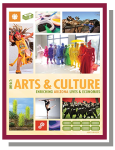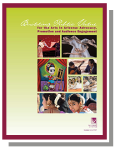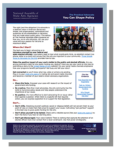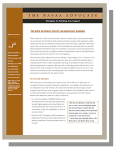The following advocacy resources provide helpful information about the value of the arts and ways to actively advocate on behalf of the arts industry.
Agency Publications
Utilizing aggregated data from the Arizona Cultural Data Project and select additional data sources, “Impact: Arts and Culture in Arizona” illustrates the myriad ways Arizona’s arts and culture sector develops jobs and revenue, contributes to economic health and competitiveness, promotes civic health and pride, and enhances Arizonans’ overall quality of life.
This booklet is designed to help artists, arts organizations and schools effectively communicate the value of their work and the importance of public funding for the arts with elected officials, community leaders, parents, donors, school board members and the public. Included are instructions and tools for acknowledging the Arts Commission and the public funding received, suggestions on how to creatively and effectively relate success stories, as well as helpful advocacy tips and tools.
Additional resources can be found on the Agency Publications page.
NEA Publications
The NEA is the only funder, public or private, that provides equal access to the arts in all 50 states, the District of Columbia, and U.S. territories, supporting activities such as performances, exhibitions, healing arts and arts education programs, festivals, and artist residencies.
In FY 2013-2015, the NEA awarded 77 grants to Arizona organizations for their work in a range of disciplines, 2 individual awards, and 3 partnership agreements totaling approximately $4.3 million in support of the arts in Arizona. Among the individual awards, both received a literature translation project fellowship.
NASAA Publications
Produced by the National Assembly of State Arts Agencies (NASAA) This two-page document explores the reach of NEA and Arizona Commission on the Arts grant awards, including an overview of NEA appropriation trends and dollars leveraged; talking points on citizen benefits of public funding for the arts; and data on the local impact of state and federal funding for the arts.
Lawmakers may ask whether government has a legitimate role to play in the arts, or may ask whether the arts should receive funds when so many other needs are pressing. This document substantiates why the arts are a sound investment, helping states achieve both short-term and longterm policy goals.
Artists, arts organizations, contributors and audiences all are stakeholders in decisions that are made about public policy. This edition of The Practical Advocate offers guidance on how you, as an arts advocate, can use your voice and your passion for the arts to maximum effect.
In addition to their intrinsic impacts, the arts produce positive community outcomes across the United States. Here are five timely reasons that public support for the arts is a good deal for citizens and for government.
A vigorous democracy periodically debates the role of government and the ways the public sector can best support the prosperity and well-being of its citizens. When those questions turn to the role of government in supporting the arts, make sure the discussion is fueled by the facts.
The message for advocates should be clear: government spending on the arts fares better when legislators understand how the arts can advance their own policy agendas. When you know how to put the arts on the public policy agenda, arts funding turns out to be everyone’s business.
Advocacy belongs in the job description of every board member of every arts organization. Discover how to enlist the experts who can make the case for public arts funding: the staff and volunteer leaders, the artists and the audiences for your community’s nonprofit arts organizations.













